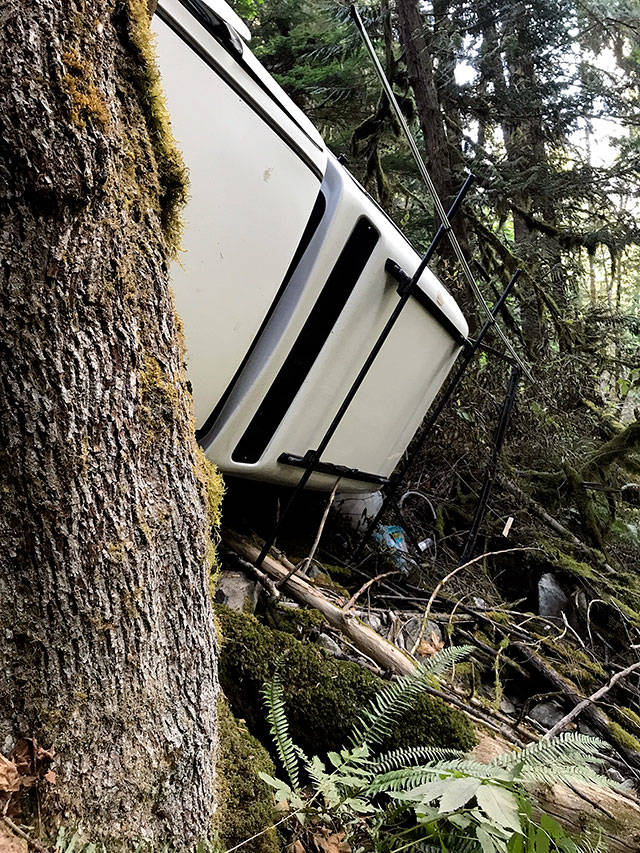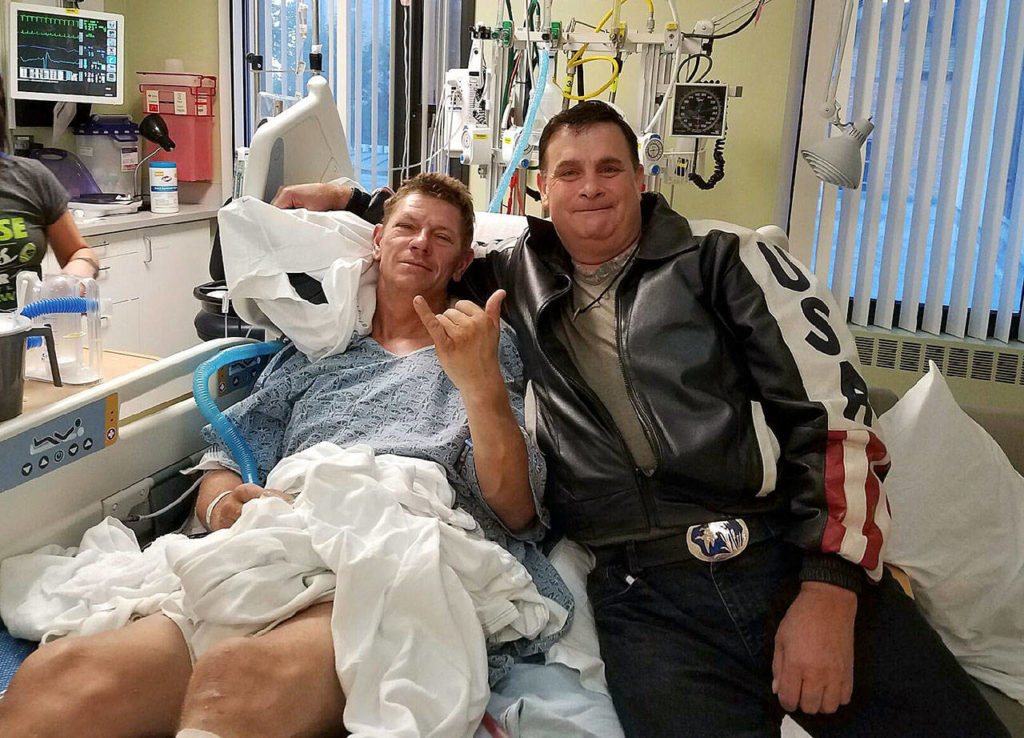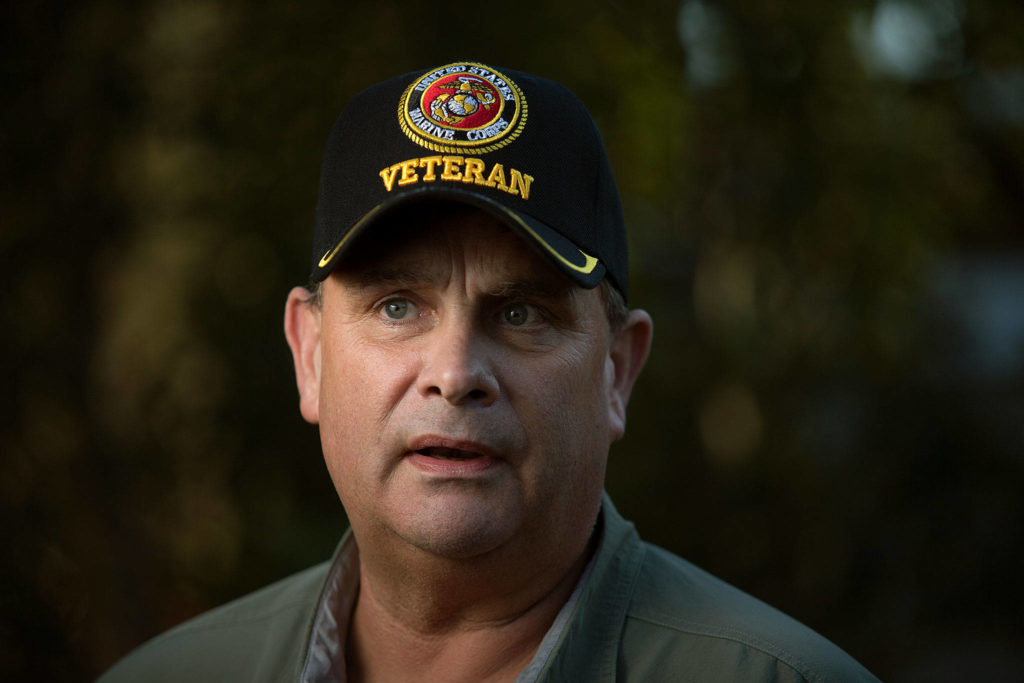DARRINGTON — That afternoon Christian Schimandle woke up falling off a 50-foot cliff.
His Toyota Tundra lurched over the edge of the forest road deep in the woods northwest of Darrington. The truck rolled down the slope, until a rotten maple tree caught the hood at the edge of a far deeper ravine. A stump pierced the window of the sideways truck, crushed the left side of Schimandle’s torso and tore a gaping wound next to his ribs.
Pinned by the stump and the steering wheel, he pulled with all his strength to free his leg. He heard two snaps in his ankle. The tree started to give way, and the truck slid closer to the edge of a 100-yard drop, like a scene in a bad action movie. Schimandle yanked his broken leg free. He crawled under the cab and across the forest floor.
He was alone.
Now, days later in his hospital bed at Harborview Medical Center in Seattle, he marvels at how close he came to death, and how luck took such a dizzying, mind-boggling swing in his favor.
What if Byron Petit hadn’t picked a Wednesday to drive up the road, for the very reason that it’s so obscure, to shoot long-range rifles with his neighbor, Jerry Lewis?
What if Petit and Lewis hadn’t happened to be on Forest Service Road 18 at exactly 1:30 p.m. Sept. 13, when that stretch of gravel sometimes sees one car or less in a day?
What if the Tundra hadn’t been damaged in such a way that the horn blared for a half-hour or so, long enough to catch Petit’s attention as he drove past? What if the horn had gone silent a few minutes earlier than it did?
What if Petit, 58, who served in the Marines, didn’t have years of combat medical training? And what if his training from the ’80s hadn’t rushed back to him when he saw the man sitting in shock and bleeding beside the truck?
Schimandle, who is Catholic, was praying.
“Like, is this it? Am I done?” he wondered. “I kind of asked God, ‘Am I coming to You? Is this my time?’ I was really contemplating the end. And then, God answered: ‘You need to fight.’ That’s what I did.”
Then a voice called out.
“Sir! Are you OK?”
Petit, a 6-foot-3, barrel-chested man from Marysville who wears a tan cowboy hat, scrambled down the 60-degree slope. Lewis, 75, an Army veteran, called for an ambulance. Schimandle was lucid, but his rib cage was heaped up on one side in a hump. Petit worried a cracked rib would puncture an organ or artery.
Yet they still agreed their best chance for survival was to get Schimandle up to the road, and away from the teetering truck. Schimandle tried to climb by himself, but Petit stopped him. He lifted him up — and Schimandle yelped in pain.
Petit tried something else. He grabbed a belt loop. His other hand gripped Schimandle’s shirt collar. He picked him up slightly off the ground, and Schimandle clawed with his hands along the dirt. Together they labored about 65 yards up the steep slope until they hit gravel.
Later, when Schimandle spent five nights hooked up to tubes in intensive care in Seattle, doctors found a half-dozen broken ribs, some in multiple places; a broken tibia; a broken fibula; a punctured lung; and the wound, 6 inches in diameter. Petit’s eyes get wide again when he recalls how he reached the road, peeled back the man’s shirt and looked inside his chest.
“When I saw that hole,” Petit said, “it was like a wave that knocked me back, and I was back to reality for a second, and I actually start to well up as I walked away.”
He did not want Schimandle to see him crying. He needed to step back. He took out his phone and started to record videos, in a daze. His mind raced: “I was thinking, ‘Baseball, football, two Whoppers for six bucks.’ ”
Basically, anything to distract himself from the trauma.
They tried to keep calm. Schimandle, 43, explained that he was a contractor from Coeur d’Alene, Idaho. He’d been working at altitude, out here in the boondocks, servicing a cell tower up on the ridge. He’d put in long hours, nine days in a row, he said, and fell asleep at the wheel, about six miles north off the paved road in Swede Heaven. He didn’t know how fast he was going when the truck crashed.
They were so far off the beaten path that they didn’t know the road number, Petit said. He’d visited the area for years, but they’d always just called it the road to Segelsen Ridge. Darrington firefighters struggled to pin down where exactly they needed to go. An airlift helicopter waited in a field along Highway 530.
Firefighters were hesitant to endorse Petit putting himself in harm’s way, but acknowledged his actions helped save a life.
“We don’t want to encourage the public to go out and do something super risky,” said Drew Bono, a fire captain in Darrington. “In this case, it paid off.”
Schimandle, a former lifeguard, is convinced he would have died if he’d stayed below waiting for firefighters to rescue him, and not just because he was bleeding. His body was in shock and shutting down. He believes God sent Petit to save him.
“He did all the right stuff,” he said. “I was an EMT a long time ago, and I know that when you encounter a patient, you don’t say, ‘Oh my God, you are totally messed up,’ because it puts them in a panic. I could tell when he looked at my back and my puncture and my chest and my ribs, that it was really serious.”
They waited. Schimandle kept nodding off, Petit said, so he tried to keep him talking. They chatted about their kids for awhile. Schimandle has two sons, he said, both in their 20s. Petit has two boys, too.
“I remember thinking I was sharing his last few moments with him,” Petit said.
Petit asked about his job, and what he’d been doing up on the cell tower. Changing out a backup generator, Schimandle said. This was his first time here, in the middle of nowhere near Darrington. His job often takes him far into the woods. He’s also a rock climber and a veteran of the Air Force.
Heights and solitude are natural to him.
“I love it, love my job, and the view from the tops of the towers up there,” he said. “You can see eagles flying, and you can see lakes and a lot of things people can’t see.”
After about a half-hour, they heard sirens in the distance.
Caleb Hutton: 425-339-3454; chutton@heraldnet.com. Twitter: @snocaleb.
Talk to us
> Give us your news tips.
> Send us a letter to the editor.
> More Herald contact information.



























